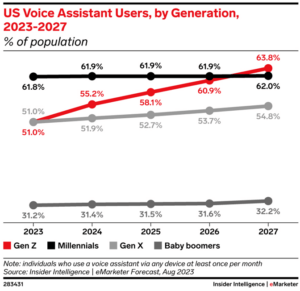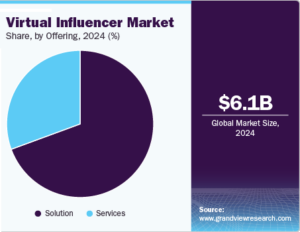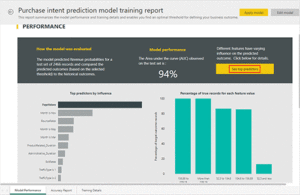Artificial intelligence (AI) isn’t just a buzzword anymore. It’s a reality that’s reshaping industries, and B2B marketing is no exception. As we look ahead to 2025, it’s clear that AI will play a central role in how businesses connect with their audiences, streamline operations, and drive growth. From hyper-personalised campaigns to predictive analytics, AI is set to revolutionise the B2B marketing landscape. But what does this mean for businesses in the sector? Let’s explore the key trends that will define the role of AI in B2B marketing over the next few years.
Hyper-personalisation goes beyond one-size-fits-all
Personalisation has always been a cornerstone of effective marketing, but AI is taking it to a whole new level. In 2025, hyper-personalisation will no longer be a luxury — it will be the expectation. Imagine a world where every email, every ad, and every piece of content feels like it was crafted just for you.
For B2B marketers, this means leveraging AI to analyse vast amounts of data — browsing behaviour, past interactions, purchase history, and more — to create customised experiences for individual decision makers.
The beauty of AI-driven hyper-personalisation is its scalability. While traditional personalisation methods often require significant manual effort, AI automates the process, allowing businesses to deliver bespoke experiences at scale. For UK marketers, this means the ability to connect with a larger audience without losing the personal touch that drives conversions.
Voice search optimisation

Businesses in the UK and around the world need to optimise their content for voice search to ensure they remain front of mind for potential clients who rely on voice assistants for information. Optimising for this audience includes using conversational keywords, creating FAQ style content, and ensuring that websites are mobile-friendly. AI-powered tools can help businesses stay ahead of this trend and adapt their strategies accordingly.
AI-driven sentiment analysis
We’ve all had those “why’s everyone suddenly gone quiet?” moments. AI is about to turn those gut feelings into hard data. Tools leveraging natural language processing (NLP) will analyse customer feedback, social media conversations, and review platforms in real time to gauge public sentiment toward a brand.
For instance, a tech firm could use AI to monitor LinkedIn discussions or industry forums, instantly identifying negative sentiment around a product launch, and addressing concerns before they escalate. These systems won’t just flag issues, they’ll categorise emotions (frustration, satisfaction, curiosity) and suggest tailored responses, such as personalised follow-ups or proactive service adjustments.
When integrated with CRM platforms, sentiment analysis will empower businesses to refine messaging, align with customer values, and build trust at scale. In sectors like finance or healthcare, where reputation is paramount, this trend will shift brands from reactive damage control to proactive relationship building.
AI-powered “Virtual Influencers” for B2B thought leadership
B2B influencer marketing is adopting AI faster than the B2C sector. This might be down to the relative scarcity of available influencers for B2B.

For example, a UK-based AI “Chief Sustainability Officer” created by a green tech company, could deliver keynote speeches at virtual conferences and field real time questions with insights grounded in data. These AI influencers must bring a human touch to brands while offering around-the-clock expertise, perfectly blending automation with a relatable presence.
Predictive partnership ecosystems
AI doesn’t just analyse customer behaviour, it can map entire B2B ecosystems to predict collaboration opportunities between businesses. For example, an AI platform might identify that a mid-sized logistics company could benefit from partnering with an IoT start-up specialising in warehouse automation, based on shared client pain points and complementary services.
By analysing market gaps, financial health, and cultural alignment, AI can propose strategic alliances, joint ventures, or co-marketing campaigns, turning competitors into collaborators.
AI-generated “synthetic data” for ethical market testing
With tightening data privacy laws, UK and European B2B marketers are starting to look at AI solutions to create synthetic datasets that mimic real customer behaviour without compromising privacy.
Examples of real-world brands using synthetic data include Vālenz, a healthcare ecosystem optimisation platform that leveraged GenRocket’s synthetic data automation to test their next-generation claims processing system. In December 2024, Shopify used synthetic data to test new functionalities within their Snowflake data platform.
Emotionally intelligent AI for high stakes negotiations
Advanced emotion-sensing AI tools can analyse vocal tone, facial expressions, and language patterns during B2B negotiations (e.g., Teams pitch meetings or contract discussions).

In the coming months we expect B2B and SaaS providers will start using AI to gauge a potential client’s hesitation during a demo, triggering real time prompts for the sales team to address unspoken concerns. These tools can also be used to train teams to refine their communication styles, ensuring cultural and emotional sensitivity during client interactions in global markets.
Self-optimising content and messaging
AI can dynamically adjust brand messaging, visuals, and tone, in real time, based on audience reactions. Picture a UK industrial equipment supplier whose website, ads, and email templates automatically shift from technical jargon to simplified language if AI detects engagement drops among non-engineer stakeholders. Even colour schemes could adapt to align with regional cultural preferences or current events (e.g., muted tones during a crisis).
AI-driven “serendipity marketing”
Breaking away from rigid targeting, AI can engineer planned serendipity by placing brands in unexpected but contextually relevant moments. For example, a UK HR software company might sponsor a niche engineering podcast after AI identifies overlapping themes in workforce innovation. Or AI could auto-generate personalised LinkedIn comments for sales teams to post on prospects’ non-work related posts (e.g., congratulating a client’s marathon achievement), thereby fostering rapport.
Neuro-marketing for B2B
This may seem far-fetched and like sci-fi to many, but it’s already happening in B2C markets. Brands like Coca-Cola, PayPal and Hyundai used neuro-marketing to analyse customer preference and improve product design.
We expect B2B brands will start using AI-integrated neurotechnology (e.g., EEG headbands) to analyse how business buyers’ brains respond to proposals, emails, or product demos. This data could identify cognitive overload points and refine messaging to reduce decision fatigue.
A consulting firm, for instance, might shorten its pitch decks after AI detects prospects’ attention dropping at slide 10, or rephrase jargon that triggers confusion in prefrontal cortex activity.
Predictive analytics
If you could predict which leads were most likely to convert, or anticipate market trends before they happen, wouldn’t you? That’s exactly what predictive analytics powered by AI can do. In 2025, this technology will be a game-changer for B2B marketers.

This may be identifying leads that are more likely to convert, or prospects that are just fishing for information, enabling sales teams to focus their efforts where it matters most.
AI can also forecast market trends, giving businesses a head start in adapting their strategies. Businesses can use predictive analytics to make smarter, data-driven decisions, optimise their marketing strategies, and be better-prepared for market volatility.
AI-driven content creation
Content is king, but creating high quality content at scale can be a challenge. B2B firms additionally struggle with making social media content interesting due to corporate policies and regulatory constraints.
A survey by the Content Marketing Institute indicated that only 19% of B2B marketers incorporated AI into their daily workflows in 2024. However, Gartner predicts that by 2025, over 60% of organisations will have a formal AI strategy in place, with significant investments in AI technologies. This suggests a substantial increase in the adoption of AI-generated content among B2B enterprises by 2025.
AI-powered content creation tools are likely to become a staple in the toolkit of B2B marketers, helping them produce engaging, relevant, and SEO-optimised content in record time.
Tools like natural language generation (NLG) can draft blog posts, social media updates, and even reports. While these tools won’t replace human creativity, they’ll certainly complement it. A rapidly growing number of marketers use AI assistants to generate a first draft of a blog post or suggest trending topics.
AI will also play a crucial role in content optimisation. By analysing audience preferences and search trends, AI can help businesses identify gaps in their content, and create pieces that truly resonate with their target audience.
AI-powered CRM
Customer relationship management (CRM) systems are the backbone of B2B marketing, and AI is making them smarter than ever. In 2025, AI-powered CRM platforms are predicted to be essential for UK businesses, providing deeper insights into customer behaviour and preferences.
AI can automate lead scoring, track customer journeys, and deliver actionable insights in real time. For example, it can analyse interactions across multiple touchpoints to identify which leads are most engaged and likely to convert. This enables sales teams to focus their efforts on high potential prospects, improving efficiency and closing deals faster.
Moreover, AI-powered CRM systems can provide personalised recommendations for each client, helping businesses nurture relationships and drive repeat business. In a crowded market, these capabilities will be invaluable for B2B marketers looking to stand out from the competition.
Chatbots and conversational AI
Chatbots and conversational AI are already transforming customer service, but their role in B2B marketing will expand significantly in 2025. AI-powered chatbots can handle complex queries, provide instant responses, and even guide potential clients through the sales funnel.
Businesses operating across multiple time zones can use agentic AI and chatbots to ensure that customer engagement remains seamless and consistent. A smart chatbot can assist clients with product inquiries outside of business hours, and agentic AI could schedule follow-ups at appropriate times to ensure that no opportunity is missed.
Conversational AI will also play a key role in lead generation. By engaging website visitors in real time conversations, chatbots can qualify leads and gather valuable information for sales teams. This not only improves efficiency but also enhances the customer experience by providing instant support.
Precise pogrammatic advertising
Programmatic advertising, which uses AI to automate ad buying and placement, is set to become more precise and efficient in 2025. B2B marketers in general have not adopted programmatic to the same extent as their B2C peers. Leveraging AI to target specific decision-makers with highly relevant ads, could see the tides turning, as more B2B advertisers rely on AI to ensure that their messages reach the right audience at the right time.
Solutions like Unyte.AI optimise ad spend by analysing performance data in real time and adjusting campaigns accordingly. For example, if an ad isn’t performing well, Unyte.AI can automatically reallocate the budget to more effective channels. This level of automation and precision results in higher ROI and more effective use of marketing budgets.
Final thoughts
The role of AI in B2B marketing is set to expand dramatically in 2025, offering unprecedented opportunities for businesses to connect with their audiences in meaningful ways. From hyper-personalisation to predictive analytics, AI will empower marketers to make smarter decisions, streamline processes, and deliver exceptional customer experiences.
However, as AI becomes more integrated into marketing strategies, businesses must also prioritise ethical practices and data privacy to build long term trust with their clients. The future of B2B marketing is intelligent, and AI is leading the way. By embracing these trends, businesses can stay ahead of the curve and thrive in an increasingly competitive landscape.
One thing is clear: AI is not just a tool – it’s a transformative force that will redefine the way B2B marketing is done. The question is not whether to adopt AI, but how to harness its full potential to drive growth and innovation.
About the Author
Aqib is a digital marketing executive at AccuraCast, responsible for planning and executing targeted online marketing campaigns that drive measurable outcomes for clients. His expertise lies in analyzing campaign performance and ensuring optimal results through data-driven strategies.











